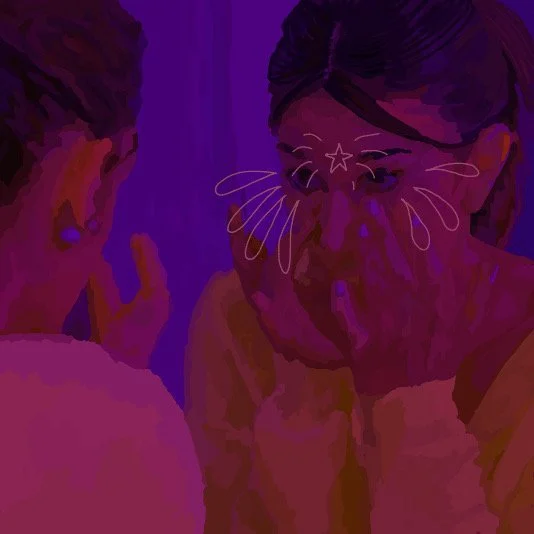LET’S LEAVE GLOW-UP CULTURE IN 2021
FEBRUARY 21ST, 2022
Illustrated by: Maria Golajewska.
The afternoon of New Year’s Day should essentially be just like any other, since it’s merely another day, right? Except for each year, I wake up with a sore head and an overwhelming amount of pressure to use the start of the new year as a ‘clean slate’ towards living a healthier lifestyle.
My Christmas break was filled with booze, food and socialising, so the guilt of not partaking in Dry January and Veganuary got the better of me, and I’m trying to find a happy medium. I don’t consider myself to be unhealthy, I eat what I feel is good for me and exercise regularly — so why do I feel like I need to use the start of the New Year well and change so many things within my lifestyle?
THE ‘BEST’ VERSION OF YOURSELF
It seems bizarre that despite living through a global health crisis, people on social media constantly push each other to come out of lockdown a ‘better version of themselves’. With both this and the pressure of New Year’s resolutions, we really need to start embracing non-linear transformations.
New Year’s resolutions have been around for over 4000 years and were initially about continuing good practices, changing an undesired trait, and accomplishing personal goals. However, with the rise of social media, this has shifted to revolving around ‘glowing up’, where being considered conventionally attractive is the main focus. This often involves a change in diet and a massive increase in exercise.
For example, Adele recently went viral for losing weight, with many praising her ‘glow up’ despite the fact that she was already attractive. Similarly, Rebel Wilson recently slammed the media for obsessing so much over her weight. She mentioned that in 2019 she played a big role in four very successful movies, yet the following year she lost weight and received a lot more press. Why couldn’t their achievements that weren’t based around appearance be praised in the same way?
‘GLOWING UP’ IS PROBLEMATIC
Not only is the concept damaging for people’s mental health, as these beauty standards are impossible to achieve due to their ever-changing nature, but the term ‘glow up’ is actually African American vernacular that has been co-opted by non-black people. The irony of this is that many non-black creators now use the term to perpetuate beauty ideals rooted in anti-blackness. So the term ‘glow up’ should be put to bed completely.
However, in some instances, New Year’s resolutions are almost beautiful. It’s great that we can anchor a date into ‘starting fresh’ and working on ourselves on a personal basis. We should make 2022 about seizing beauty narratives and focusing on what makes us happy. So, how can we stick to personal resolutions? The word ‘new’ involves the excitement of something that hasn’t gone wrong yet, or become boring or difficult.
But, I think that there is a fine line between using the start of the year productively to work on yourself and using the ‘I’ll start on the 1st January’ approach as an excuse to procrastinate. The worst part is that most people know this is procrastinating, this is why we make those plans. So, now is the time to embrace the non-linear personal transformations —if it’s a resolution that will truly make you happy, why not start now?
It’s human nature to anchor dates into things, we work around deadlines. But we need to adjust our mindsets and remind ourselves that if we didn’t start something today, that’s ok! Each year can be made the best year yet, even if you don’t start working on your goals from January 1st.



